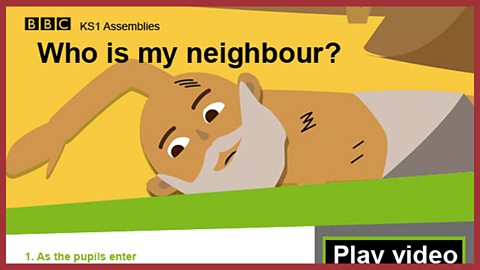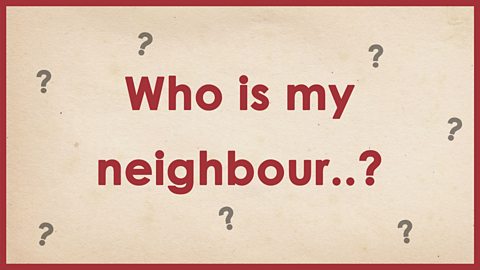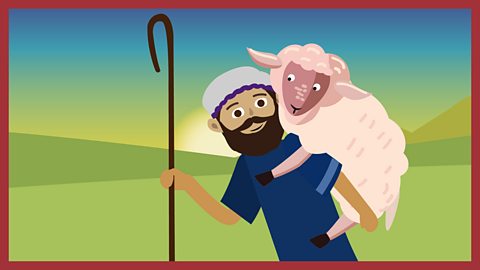In short...
Themes: Being 'a good neighbour'; the stories of The Good Samaritan and The Lost Sheep; Jesus the teacher.
Summary: This assembly, suitable for an act of collective worship, explores the question 'Who is my neighbour?' It encourages children to think about the things that they might learn from the stories of The Good Samaritan and The Lost Sheep and how our world might be a better place if everyone treated their 'neighbour' well.
Resources: The ; the slideshow 'Who is my neighbour?'

The video
The first story is one of Jesus' most important parables - The Good Samaritan - and explores Jesus' answer to the question 'Who is my neighbour?' Jesus tells a story about a Jewish man who is robbed and left for dead, who is finally cared for by a Samaritan - that is, someone expected to be an enemy of Jews.
The second story - The Lost Sheep - is told by Jesus in response to complaints that he has been mixing with the 'wrong kind of people.' In the story a shepherd has 100 sheep, but goes in search of one that is lost, risking his own life to rescue it.
Duration: 4' 14"
End of speech: 'ā¦to teach people to think about how God treats people and how we should treat everyone else.'
Video questions
- Why did Jesus tell the story of The Good Samaritan? (To answer a question from the crowd - 'Who is my neighbour?')
- How many people see the injured man in the road? (Three: the priest / the priest's helper / finally The Good Samaritan)
- Where is the third person from? ('Samaria' - so he is called a 'Samaritan')
- Why is it a surprise that the Samaritan helps the injured man? (The Samaritans and the Jews were enemies)
- Why did Jesus tell the story of The Lost Sheep? (Jesus had been criticised by holy men for talking to everyone equally so he told the story to explain that God loves everyone)

Key links
Download / print the assembly framework ready for use

Slideshow: Who is my neighbour? image
Click through the images to consider 'Who is my neighbour?'

Click to display the image full-size


Suggested framework
1. Entry
You could play the theme song from the TV series Neighbours.
2. Introduction
Display the first image from the slideshow 'Who is my neighbour?' Ask pupils to suggest some answers. You could do this in conjunction with the remaining images in the slideshow, which display some possible answers - eg someone who lives next door, someone who lives near me, someone I sit next to in class, someone in another country, anyone. You could take a vote at this stage to identify who the children regard as 'neighbours'.
3. The video
Play the video. It begins with a short introduction to the Christian religion and the context for these stories. The story of The Good Samaritan ends at 2' 32" with the words 'ā¦you go and do the same.' You might choose to stop at this point. There follows a link between the way Jesus treated people and another of his parables, The Lost Sheep, which begins at 3' 04" and ends with the sentence 'ā¦Jesus used lots of stories like this to teach people to think about how God treats people and how we should treat everyone else.'
4. After the video
Use the Video questions to help recall of the events and to help pupils make links between the stories. You will need to adapt some of the wording of the reflection if you used only the first of the stories.
5. Time to talk
Take another vote about 'Who is my neighbour?' and compare the result with the first vote. Ask the children to decide what are the most important messages from the story(ies). Share feedback as time allows.
6. Opportunity to sing
An opportunity to sing your chosen song. Suggestions from “óĻó“«Ć½ collections are below.
7. Opportunity to reflect
We've been thinking today about being a good neighbour and loving others, as Jesus taught in his parablesā¦
We've thought about what these two stories might meanā¦and whether we can learn from them ourselvesā¦
I wonder how Jesus' stories changed the people who heard themā¦?
I wonder whether they might change usā¦?
8. Opportunity for prayer
Dear God,
Thank you for Jesus' stories about how we should treat others and about the love that Jesus had for everyone he met.
We are sorry that our world is not like this all the time.
Please help us to be the best kind of neighbours that we can be - and be loving towards others.
Amen.

Suggested songs
Song: 'Chain of love' (All about our school, no 14. Vocal version)
- For the children of tomorrow
Weāve got to make it a better place,
Fill the world with love and laughter,
Make a fresh start for the human race.
(Chorus)
Chain of love, chain of love,
Circle the world with a chain of love,
Chain of love, chain of love,
Circle the world with a chain of love.
- No more war and no more hunger,
No more jealousy and hate,
Say goodbye to greed and sadness,
Make a change now or it will be too late.
(Chorus)
(Middle eight)
Circle the world, circle the world,
Circle the world, circle the world.
- Doesnāt matter where you come from,
Doesnāt matter where youāve been,
Different race or creed or colour,
We are the same underneath our skin.
(Chorus)
Chain of love, chain of love,
Circle the world with a chain of love,
Chain of love, chain of love,
Circle the world with a chain of love.
Circle the world with a chain of love.
Song: 'Being a friend' (All about our school, no 8. Vocal version)
Being a friend is the best thing you can be,
āØāCos in the end friends are something we all need.
You could score a goal for England,āØ
Be a pop star on TV,
āØBut being a friendāØ
Is still the best thing you can ever be.
Being a friend is the best thing you can do,āØ
Time and again itās our friends that help us through.
You could be a millionaire,āØ
Or fly a rocket to the moon,
āØBut being a friendāØ
Is still the best thing you can ever do.
Whatever we grow up to be,
And live in harmony,
Together we all need to see
That friendship is the key!
Being a friend is the best thing you can be,āØ
āCos in the end friends are something we all need.
You could score a goal for England,
āØBe a pop star on TV,āØ
But being a friendāØ
Is still the best thing you can ever be.
Being a friend
āØIs still the best thing you can ever be.
